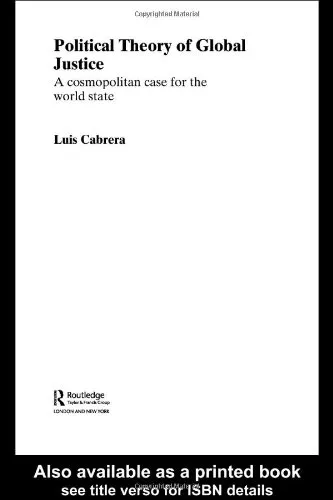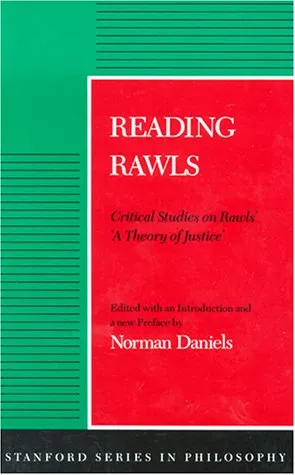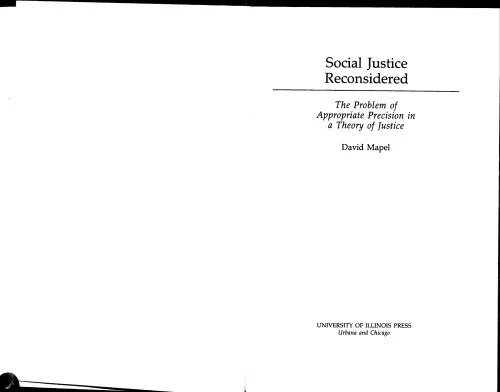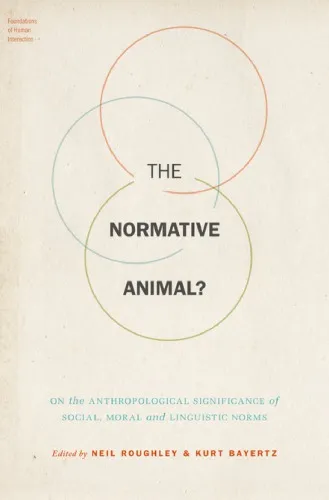Imperfection and Impartiality: A Liberal Theory Of Social Justice
4.3
Reviews from our users

You Can Ask your questions from this book's AI after Login
Each download or ask from book AI costs 2 points. To earn more free points, please visit the Points Guide Page and complete some valuable actions.Related Refrences:
Introduction to 'Imperfection and Impartiality: A Liberal Theory Of Social Justice'
Welcome to an exploration of 'Imperfection and Impartiality: A Liberal Theory Of Social Justice', a work that delves into the complexities and nuances of contemporary liberal thought on social justice. This introduction outlines the core concepts, key takeaways, and importance of the book, offering a glimpse into the rich discussions it inspires.
Detailed Summary of the Book
The book begins by scrutinizing the traditional liberal frameworks that have dominated discussions of social justice. It argues that many existing frameworks are overly idealized, relying heavily on the assumption of perfect rationality and impartiality that fail to account for the imperfections inherent in human nature and social structures. The work emphasizes the necessity of adopting a more nuanced approach to justice—one that embraces imperfection while striving for objectivity and fairness.
Through a series of thought-provoking analyses, the book elaborates on how classical theories often overlook real-world complexities such as socioeconomic disparities, cultural diversity, and historical injustices. By drawing on a broad spectrum of philosophical insights and practical examples, 'Imperfection and Impartiality' proposes a more flexible and context-sensitive theory that acknowledges human limitations and the challenges in achieving impartiality.
The text navigates through key areas such as the distribution of resources, rights, and opportunities, suggesting that liberalism must evolve to remain relevant in addressing contemporary challenges. The author advocates for a progressive liberal theory that better accommodates diversity while maintaining a commitment to equitable principles.
Key Takeaways
- Embracing Imperfection: Recognizing and integrating the imperfect nature of humans and societal structures into theories of justice.
- Contextualization: Moving beyond one-size-fits-all solutions to adopt context-sensitive approaches that address specific societal challenges.
- Inclusive Impartiality: Balancing the principle of impartiality with the practicalities of pluralism and diversity.
- Dynamic Liberalism: Encouraging a liberalism that adapts to contemporary social, economic, and cultural realities.
Famous Quotes from the Book
"True justice is not an abstraction but a practical pursuit, one that acknowledges our human fallibilities while striving for dignity and equity."
"In a world woven with differences, impartiality cannot mean blindness to those differences but a conscious effort to see through them to the common good."
Why This Book Matters
'Imperfection and Impartiality: A Liberal Theory Of Social Justice' is a significant contribution to the discourse on social justice because it challenges the status quo of liberal theory, urging both scholars and practitioners to rethink and innovate. It is an essential read for those interested in political philosophy, ethics, and social policy, offering fresh perspectives that are increasingly necessary in today’s globalized world. By advocating for a liberalism that is flexible, inclusive, and responsive to imperfection, the book aligns with a vision of social justice that is both aspirational and attainable.
This work stands out for its commitment to bridging the gap between ideal theory and practical application, making it invaluable to a diverse audience seeking to craft more equitable societies.
Free Direct Download
You Can Download this book after Login
Accessing books through legal platforms and public libraries not only supports the rights of authors and publishers but also contributes to the sustainability of reading culture. Before downloading, please take a moment to consider these options.
Find this book on other platforms:
WorldCat helps you find books in libraries worldwide.
See ratings, reviews, and discussions on Goodreads.
Find and buy rare or used books on AbeBooks.
1235
بازدید4.3
امتیاز50
نظر98%
رضایتReviews:
4.3
Based on 0 users review
"کیفیت چاپ عالی بود، خیلی راضیام"
Questions & Answers
Ask questions about this book or help others by answering
No questions yet. Be the first to ask!














